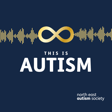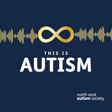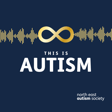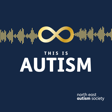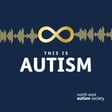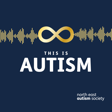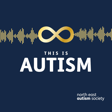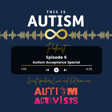Become a Creator today!Start creating today - Share your story with the world!
Start for free
00:00:00
00:00:01

9. Autism Diagnosis
Katie Toner shares her journey of self-discovery, explaining how, before her diagnosis, she often felt anxious and out of place. After receiving her diagnosis, Katie realised she wasn’t broken, just different, and began to understand how to thrive in her unique way.
Using her personal experiences, Katie now helps neurodivergent children and young people embrace their individuality and learn to communicate their needs. She founded Dark Sky Sleepovers, a business offering themed events, and The Wild Bunch, which provides training in sensory regulation.
In this episode Katie talks to Kerrie Highcock, family development manager at NEAS about the diagnostic process and how it has shaped her life.
Transcript
Finding Validation Through Diagnosis
00:00:09
Speaker
I think the best word is very validating to get your diagnosis. It's important that the diagnostic process self-focuses more on the person's experience rather than the person's experience just in the negative. Like say i having ADHD and autism is like having two different sides of your of your brain that like fight each other.
00:00:37
Speaker
Hello and welcome to This is Autism, the podcast from the Northeast Autism Society.
Podcast Introduction
00:00:41
Speaker
My name is Kerry Highcock and I'm the Family Development Manager at the charity. Today, I am really pleased to be talking to Katie Toner, a young business woman who is autistic and has ADHD.
Pre and Post-Diagnosis Journey
00:00:51
Speaker
Katie says that before her diagnosis, she struggled with feeling anxious and weird. Afterwards, she realized that she wasn't broke and just different and began to learn what she needed to thrive.
00:01:02
Speaker
Now, Katie uses that knowledge to help neurodivergent children and young people celebrate who they are and communicate their needs. She's just set up a business called Dark Sky Sleepovers, creating themed events and another one called the Unite Club, which delivers training and sensory regulation. We'll be talking about the diagnostic process and what it's meant to Katie. Thanks for joining us.
00:01:23
Speaker
Hi Katie, are you okay? Hello Kerry, lovely to speak to you as always, I'm well, how are you? I'm good, I'm good, good, good, lovely to have you on the podcast.
Meet Katie Toner
00:01:32
Speaker
So Katie, can you just start by telling us a little bit about yourself? Yes I can, so I am 29 and I live in Northumberland, I'm originally from Middlesbrough but you know, we just not tell anyone, no I'm kidding.
00:01:46
Speaker
But and yeah, so I live with my family who are neurodivergent as well. um as As you've already said, I run my business, Dark Sky Sleepovers and G and I club as well, which gives me the opportunity to meet loads of different families around the Northeast. And it's just really exciting to get to be sort of a part of people's journey. Brilliant. Thank you for that introduction.
Realizing Differences and Early Diagnosis
00:02:07
Speaker
So at what point Katie, did you realise that and you may be autistic?
00:02:13
Speaker
I think for me it was less of a realisation of oh I might be autistic first of all and it was just a oh I'm definitely a little bit different to my friends and I think for me it was when I started realising that I wasn't really always invited to my friends houses or when my friends asked the mams if I could go around they kind of looked at them as if to say not Katie.
00:02:35
Speaker
like or she's a bit much you know like um I didn't really think I was that much compared to my friends but obviously I was you know um and so yeah then my brother actually he was 11 years younger than me he was diagnosed as autistic when he was about 10 years old um and I was still so really struggling with my mental health at the time and it's kind of gone through lots of different things but I know we'll get to that a bit later on and Once he was diagnosed, I was kind of like, ah, maybe that was making me struggle as well, given that we've exhausted all the other options. And and then once we looked at it, um it really was very clear and we were like, how did people miss it, you know? And what kind of did that realisation feel like for you, Kate? You know, firstly, that I'm different at to other people and kind of getting that validation, what did that
00:03:33
Speaker
What was it like for you? I think, yeah, you touched on it really well at the start when you said, you know, I felt a bit weird and and and then I found out that I wasn't really broken. And that kind of a ah goes back to it a bit of an analogy I like to use and called the walkie talkie effect. and that I always say to people, it was kind of like I was wandering around and seeing everybody else used to walkie talkie and pressing the button and kind of hearing, yes, roger that over and out. And it worked so well for them all. And when I pressed the button on mine, I just heard like static noise. Every so often I might get through, but it wasn't very clear and people didn't really get me. And I'd go and I'd say it to people, it's not working. And they'd say, you know, just turn it up.
00:04:14
Speaker
And I tried that and I still didn't hear you very clear. And I said to them again, it's still not working. And they said, change the batteries. And that didn't work. And then I said, it's still broken. And they said, well, clearly you just don't know how to use a walkie talkie gate. Because everybody else in the classrooms using a walkie talkie perfectly fine. Everybody else that works using a walkie talkie perfectly fine. And then I got my diagnosis and it was like somebody said to me, oh yeah, it's fine. You just, you just need to use channel two instead of channel three.
00:04:45
Speaker
And then you find people that communicate on your wavelength, you know, and it was like I had a whole host of people going, Oh, finally, we've been screaming into this waiting for you to come along. And it was all, you know, the other diagnosed people and and allies of the community. So for me, that's the sort of best way I can describe that sort of loneliness and almost working on a different frequency to other people a little bit.
00:05:09
Speaker
That is, honestly, that's ah such a good analogy.
The Diagnostic Process Challenges
00:05:12
Speaker
and So what was the diagnostic process like for you then, Katie? Were there any barriers or challenges? Yeah, well, actually, for me, it's really interesting because I was diagnosed in 2020 during Covid. So I was already on a wait list and then the world shut down and I was getting emails, putting off appointments and putting off appointments. And at that point,
00:05:34
Speaker
We kind of felt like, gosh, if I don't get this diagnosis, we don't have another option of like, so one of the better words, you know, in inverted commas, what's wrong with me? I was really struggling and we tried everything else. And it got to a point where we kind of rang up the da diagnosis people and were like,
00:05:57
Speaker
I don't care what you guys have to do, but I've been on a wait list for long enough now and you said I would be seen. So like figure it out and help me be seen because nobody else wants to help me and like me mental health is very bad. And then all of a sudden I was seen. Um, and again, because it was COVID, I wasn't seen in person. It was over the phone. Um, yeah, I think I don't even think it was on zoom. I think it was over the phone. Um, and I remember,
00:06:25
Speaker
worrying so much beforehand about thinking well if they can't see me how are they're going to know they might not see me pacing around and all the things you worry about um and then I got off the phone and I thought I sort of thought oh there's no way she's couldn't believe me that's what I thought I thought you know she said she's going to ring me back today that like there's app like obviously that means that she doesn't think I am because she she must need longer to decide but it turns out she very much thought I was and that's why she only needed to ring me back within a few hours because that apparently proved my point and and like I say because my brother was already autistic and bless him once he got his diagnosis he kind of moved to a new school and he stood in front of the kids and he said
00:07:07
Speaker
just want you all to know that i'm autistic and that means my brain works a bit different so if i say things that are a bit strange don't bully me because it's just me and it's sort of like that made me feel like fine with it and i think i'd have been okay any with it but it was just really sweet kind of how we went about it and so for me it was i think the best word is very validating to get your diagnosis Obviously, there was barriers with times and and things like that. And I'm lucky that I was you know believed first time, as it were, because I know a lot of people you know really struggle to get a diagnosis and sometimes have to go back and forward a few times. So I'm glad I got it. But as I say to lots of people, you sometimes given your diagnosis and then just told right off you go.
Post-Diagnosis Support Needs
00:07:50
Speaker
ah there's a there's a list of links to things you might find useful or a few pamphlets that might be good to you or might not but you have a look through and see what you think would work and you kind of sat there thinking i don't know if i knew what worked i would have just skipped this process and done the thing that worked i don't so i need your help so that's kind of why i actually started your night club is to be that stop gap for adults and kids who were kind of either thinking about the diagnosis have just had it or have got it and then ah don't know where else to to turn really so it's all based on my experience. So Katie what do you think would have been really helpful for you after that you know what post-diagnostic support would have been useful do you think? I think it's really important that
00:08:38
Speaker
well you when you go through the diagnosis process. And I think this is where it maybe differs a little bit to the ADHD process. Maybe it's because I was diagnosed ADHD privately, but in the ADHD diagnosis, I was almost given some strategies of my of what might help. I don't necessarily feel like after my autism diagnosis, I was given those strategies. and I was sort of given a sheet of paper that says these are the things Katie struggles with.
00:09:06
Speaker
i And it wasn't an exhaustive list, it was quite small, the report, I think it's two sides of an A4 piece of paper. Which I'm definitely not a new spoken to me before, Kevin. No, you're not at all. I don't know how they summarised it all in two sides of A4. Me neither, but they did a good job. But yeah, I think it would be better if they, you know, gave a lot more understanding around like sensory needs and things like that. Because for me, that's a big challenge. And I went and then paid for an OT diagnosis.
00:09:37
Speaker
And when I got my OT diagnosis, it was like she'd told me I was a whole different person to who I thought I was. And I was like, oh, I'm not surprised. I'm struggling so much. And I think it would have been beneficial if
Exploring Multiple Diagnoses
00:09:49
Speaker
I had that support after my autism diagnosis, particularly because a lot of people that have got a diagnosis as an adult often have experienced um Other diagnosis is previously, so for me it was like, well you're anxious and you've got generalised anxiety and then it was you've got anxiety about this and then it was you've got depression and then it was, well you might have bipolar but you might not.
00:10:27
Speaker
i got They all freak out because like I say to them, oh, before you got your diagnosis, will you diagnose those with these things? And they go, oh, that's really weird. And I'm like, yeah, because we all have the same story. um you know So for me, it would be important for them to help people understand it.
Focus on Strengths Over Negatives
00:10:42
Speaker
And as well, I think it's important that the diagnostic process itself focuses more on the person's experience rather than the person's experience just in the negative.
00:10:55
Speaker
chiy parents going in with kids as well, because you're going in as the parent and you're saying, and essentially, these are all the things my child struggles with or is bad at, you know, and not great at communication or emotional regulation or getting themselves, whatever it is, and you leave that appointment, either with a diagnosis, but not much support and lots of negative things in your mind about your child potentially, or you leave without a diagnosis, but you've still got all those negative things and no support.
00:11:25
Speaker
you'd never go into a diagnosis and hear a parent say, you know, my child's hyperlexic and, you know, was reading Harry Potter at three years old or my child's a real social butterfly and they're so empathetic and great people's emotions. But that means that they struggle with managing their own or, you know,
00:11:42
Speaker
My child's part of the football team and they're only six and it's the under 10s or whatever it is, you never hear them celebrate the good things and you'll know yourself working with families. All these children have such amazing qualities that they have alongside the things they struggle with. And I think families were able to share and acknowledge those things. It would make the difficult days, which we all have, a little bit easier to manage because you know that you've got those positives as well.
00:12:11
Speaker
Absolutely, Katie. We're going to take a little break now and then we're going to come back after our break and talk a little bit more to Katie around masking and what she does day to day as well.
The Masking Experience
00:12:24
Speaker
Hi, while we're on a quick break, I thought I'd tell you a little bit more about the Family Development Service here at the North East Autism Society. The Family Development Services provides support for families pre, during and after diagnosis and includes a variety of services including our parent and toddler groups, autism hubs, workshops for families, a dedicated inquiry line and our resource site as well which can be found at the Family Resource site on the North East Autism Society website.
00:12:50
Speaker
so if you go to ne-as.org.uk and go along to the family development site you can find all the information there. Hi welcome back to This is Autism. Today we're discussing the autism diagnostic process with the lovely Katie. So Katie, we've spoken quite a bit there about the diagnostic process um and I think one of the things that comes up time and time again particularly for later diagnosed people is you know, masking. So how would you describe masking? Is it something you do? what's What's your experience of it? Yes, I think um I'm definitely a masker. And I think that's probably part of the reason why I was diagnosed later in life. During school, I was the typical sort of gifted and talented child and that was, you know, and I don't say that meaning and I thought that it's what they called you in school if you were, you know,
00:13:45
Speaker
you know, an overachiever, basically, a perfectionist that wanted to do everything right. yeah um Which was wonderful for me, riddled with anxiety, no, not really. um And I also did a lot of musical theatre and performing growing up, ask actually, which I think sort of almost helped with the masking in one way, but didn't in another, because people just saw, oh, there's Katie, you know, she's being the central attention and I sort of blurred the lines and you almost must become like a character and it's not even something that you necessarily do on purpose but I mean I specifically remember the older years of high school being really tricky for me because I didn't really
00:14:34
Speaker
I didn't really feel in my brain like I was the age of everyone else.
Unmasking and Personal Change
00:14:39
Speaker
It was very strange. I wasn't really like interested in the things that they were interested in. I didn't necessarily want to go on dates with boys, but I kind of did because people said I showed or like go out drinking, buddha did but didn't think that I showed.
00:14:52
Speaker
um ah So then yeah your mask kind of almost becomes like, oh, well, I'm going to cosplay as a teenager today kind of thing. Or you get to work and you're like, okay, I'm going to cosplay as an employee today. And you sort of have to switch on a different mask. I mean, my anxiety at one point when I was at work, when I was 18 years old, was so bad that instead of just calling in sick and saying, I've hurt my leg, I can't come in.
00:15:23
Speaker
I threw myself down the stairs to hurt my leg so that when I got to work the next time I was in, I actually had a limp so that I wasn't faking it and I wasn't lying and I was actually ill. That's like how deep the mask was going. it was it was like It's laughable to me now, but like it is and a madness to to do that. like to be walloping your joints off things so that you've got a bruise, so that when people say, oh, like did you really hurt yourself? you're like Yeah, there's the bruise. and So, yeah. And then for me, what happened was I moved to Australia when I was 19 because I was very depressed and I was due to go to university. And I thought, well, I might as well be depressed in the sunshine.
00:16:07
Speaker
see like and And I kind of thought, well, no one really knows me here. So it doesn't really matter if I'm the, you know, blunt, sarcastic person that I am, that, you know, people kind of say, oh, well, you know, Katie, like, just like, don't have much tact to do you all, like, you know, watch what you say. on like Maybe you don't say it like that or whatever it might be. And so it was just me and I sort of unmasked for a while. And then when I came back to England, actually my mum said to me, oh, you know, you're not the Katie that you were before you left. Like you used to be like really happy and like bouncing about. And now, you know, like sometimes you're like quite dark and things. And I said, I know, but I never really, really he felt like that.
Societal Pressures and Unmasking
00:16:52
Speaker
ah just don't pretend now so it might be more uncomfortable for people around me because I'm not pretending that I'm okay and I think for a lot of us that's where the mask comes from is letting people think that you're okay because you might have tried to show them that you're not in the past um and you know not by anyone's fault they just might not have picked up on it or they might have said you know you find don't worry or You know, it's the typical people say to you, you know, oh, how are you doing? You're all right, Kelly. And if you say anything more than, oh, yeah, I'm all right, then if you see all the things that have gone brilliant in your life, you show it off. And if you see all the things that suck in your life, then you're depression. Oh, well, I don't, you know, don't really need to hear about all that at tea time, Kelly. We try and have a nice meal with the family. like
00:17:38
Speaker
Why are you depressing everyone? Or why are you showing off? like um Uncle Steven's just lost his job and you're talking about your promotion. You can never win, so you just start saying, well, I'm fine, I'm fine, I'm fine. And then you sort of just convince yourself and then you end up really not being fine often, I think is the case really. So for me, I'm i'm coming to a point now where I'm i'm starting to unmask and for for anybody who is sort of starting that process or just say, you know, like start with the people that you trust the most, you know, because it is exhausting shedding that mask because you're being the real you and it's equally exhausting carrying it around all the time, you know, so find that balance and um with people that you trust that way, it's less anxiety inducing to sort of be yourself. Yeah.
00:18:25
Speaker
how How important was it getting in the diagnosis in terms of unmasking?
Identity and Acceptance Journey
00:18:31
Speaker
For me, it was incredibly important. I mean, as ive so as as I said earlier on, I am a perfectionist and I hold myself to the highest standards but that anyone else could hold me to. And I really struggled with um things like executive dysfunction where I'm sat and I'm thinking I need a shower, I need a shower, I need a shower, I need a shower. And I'm sat for three hours thinking I need a shower, I need a shower. And I'm not saying I'll just have one tomorrow, which is what a lazy person would do. while I will have one next week because they're not that bothered. I just sit all day thinking I need a shower or all day thinking I need to write this invoice or I need to do
00:19:14
Speaker
my homework when I was at school and it doesn't get done and it's frustrating because it's like you're giving a game and you're trying to play it on hard but your controller doesn't work properly or you haven't been given the um instructions and you're trying to play it at such a higher level to to what your capacity is And I'd gone through all the possible options to help myself that I could do. I'd done talking therapy and I tried to find a hobby and I tried taking antidepressants and of all the different kinds. And I was basically rattling at one point, I was taking that many tablets to try and sort my mental health out. And for me, when I finally got my diagnosis, it was like, Oh,
00:20:00
Speaker
right. Okay. So like. when other people are in on the joke and I'm not that's why it's not because I'm stupid and I just don't understand it's literally because like sometimes you're one step ahead over of other people like I remember in school my friends would get angry with me when we would make dances up in primary school because they'd say to me you already know that dance you've made it up before and I was like I haven't I'm just listening to the words of the music right now and I realized now that it was just my pattern spotting You know, I wanted to ruin movies because I'd be like, that person's going to do that now. It's obvious. And then it would happen. And everyone would be like, are you ruining it? You've seen it before? And I was like, well, I haven't, but it's obvious, like the music and this and this and this. And, you know, for me, it was like, oh, OK, like I'm not just a horrible person. I'm not, you know.
00:20:46
Speaker
For me, you get lots of labels when you don't have your diagnosis. I was bossy, overconfident, bullshit, didn't have any tact. I was sarcastic, but not necessarily. In the nice way, I had a lot of attitude. I was banned from watching Tracy Beaker because I had so much attitude as a child. All these things are unreliable once I got to work. I'm the least unreliable person you'll ever meet. I'll roll up you know, and then go to hospital the next day, like, yeah it' that's not me at all. So for me, I would much rather be labelled autistic than all those other negative things, because autistic is neither a negative nor a positive. It it just is. It's just me. And know all the things that come with it, you know.
ADHD and Autism Interplay
00:21:40
Speaker
and I know you're autistic Katie and also have ADHD. what is What is that like? What's kind of the interplay between the two differences for you? am It's a wonderful experience, um almost like having a married couple in your head. Sometimes they get on really well and other times they argue um incessantly and want to do the antithesis of each of them are all given opportunities so my brain loves structure and routine but absolutely despises it at the same time and just wants to like go on holiday tomorrow because that's fun ah you know so it's really difficult to try and plan anything really that will last a long time and I always say that you know
00:22:27
Speaker
Audi HDs, especially we don't necessarily build in habits. We build in routines. So for me, it's really important that I build in routines. So rather than saying, right, I need to do this specific piece of work at this specific time on this specific day.
00:22:43
Speaker
I have different days of the week for different jobs. So Monday is usually social media or business. So there we go. This ticks off both of those. Well done, job done. I'll go on all the day for the rest of the day. But as I say, it just means that, and my my schedule even actually says on it,
00:23:01
Speaker
This planner is a prompt. Use it to recreate consistency so that my PDA didn't look at it and go, well, I'm not doing that because you've told me to. So even even my planner allows that flexibility for me to go, fine, well, I'm doing social media, but I'm doing this because that's the thing I want to do, not not the thing I need to do. um And yeah, it it really is a battle. It's really exhausting, especially at the moment when there's an ADHD shortage.
00:23:28
Speaker
um And I know I just mentioned to you that I've recently had a physical pain flare up after two years. um And the only real thing that's changed in the last year is the fact that, oh, the last four, five months is the fact that I've had no ADHD medication. And now that's caused me to be in hospital in physical pain for five days. So that's the sort of impact that that overwhelm can have. and Like I say, I have an ADHD and autism is like having two different sides of your of your brain that fight each other quite a lot and it it really wears you out, especially when you add Ellis Dan loss and the chronic fatigue that comes with that as
Challenges in ADHD Diagnosis
00:24:05
Speaker
well. so
00:24:06
Speaker
It's all about creating structure and routines that am help both parts of your brain sort of thrive. And actually what I found is once I got my autism diagnosis, my ADHD was the thing that almost impacted me more. And when I got my autism diagnosis,
00:24:23
Speaker
I said to them, I think I've got ADHD. And they said to me, oh, well, we're the team that do ADHD diagnosis as well, Katie. And if if you did have it, you know we we're not sure we you'd really be medicated. So I don't think it's really worth like yeah getting it really for you. and So I went through the right to choose process. And and once I got my diagnosis, I'm now actually ah on two different types of medication for my ADHD. and And it took me three years between my autism and my ADHD diagnosis.
00:24:54
Speaker
to get them and in that time I probably spent a total of about 20 to 30 weeks in hospital in agony and that's purely from physical burnout and once I started on the ADHD meds pretty much all of those symptoms went.
00:25:09
Speaker
so sometimes it's really frustrating because sometimes you wish people would just listen to you and often I'll go to mental health appointments and things where I'm talking about my ADHD and my autism and and professionals that say to me oh do you know it's you've got such a good understanding of yourself like it's so brilliant the way you word it and it's brilliant that you've got so many strategies and coping techniques and I have to say to them yeah but at The only reason I'm an expert is because none of you who were paid to be the experts would believe me or do their job. So I've got all this knowledge and all the information and I do all this work and I don't get paid a dime for it. And then I come here and then you don't believe me. So it's ah it's really difficult, um like I say, but it's just about trying to come up with routines.
00:25:55
Speaker
Yeah, absolutely. there there' To be honest, Katie, there's a lot of um I'm making some notes because I think we'll have you on again on a different podcast about some of the stuff you've just you've just spoke about. we could do We could do lots of different podcasts with you. and So my last question is, just just tell us a little bit about you know what you're doing now. I know you're doing a lot of public speaking, you've got your own businesses, you're doing some wonderful stuff.
Community Support Through Unite Club
00:26:19
Speaker
Just tell us more about that. yeah So it all really started and Just after my diagnosis, I started my Dark Sky Sleepovers business, meeting lots of families, and and the message from many of them was the same in that it feels like we're the only one. It feels like there's no more one like us and we've got no support. um And I very quickly wanted to do something about that that wasn't just once a year, which is lovely celebrating your birthday, but people need help all the time. and so
00:26:49
Speaker
I started Unite Club and it's the opposite of Fight Club. The first rule of Unite Club is you've got to talk about it to everybody. and that's That's the rule and really it's just a place, you know, our tagline is Grow Connect and Unite and really that's what we want to help families in the northeast do, you know, grow through knowledge and youth clubs and places where families can spend time together just being They don't need to be happy or be sad or be sensible or be, or like all the other families, they just need to be full stop. That's fine with me. And whatever that encompasses, we're good to go. You know, and connection again, you know, giving them a place where they can meet other people like them. Cause we all feel like we're the only fish in the sea until we, you know, swim around a little bit further and and and see other people. and
00:27:40
Speaker
It's really nice to be able to give people those connections and you'll know yourself once you find somebody, you know, you find your tribe, you're like, oh, and you can really give them that deep breath. I always say, you know, the first thing that people can do when they come to meet me or your nightclub is just take that deep breath.
00:27:59
Speaker
that we all need to take when we're sort of going through this wonderful, spicy brain journey. and i'm yeah night At the end of the day, give people the tools, the knowledge to be able to go and say to you know the uncle that doesn't understand why your child needs an iPad and everybody else doesn't, or the teacher at school that says, well, you don't need fidgets because you know as one person has heard from a school,
00:28:26
Speaker
Artistic kids are just like everybody else and they need to learn to concentrate like other people because they're not always going to get and different things and it's like, not if you've got that attitude, they're not. um So, you know, or everybody else, we can't give you a fidget because everybody else is going to want one, nor the aunt. I went to school with a boy who had diabetes and I had a Mars bar.
00:28:48
Speaker
in class. And I didn't try and nick his Mars bar or warn that he got a Mars bar and I didn't. I was just like, Oh, well, it's good that he's not gonna have a seizure now. So enjoy your Mars bar. That's not how kids work. It's how adults work. You know, don't sort of project that.
Advocacy and Empowerment
00:29:05
Speaker
So that's what your nightclubs about really. And I do one to ones with families. um And you know, I say like, money's not a barrier. yeah Inclusion, you know, is in includes money and um location and all and all of that. So I'm actually working with a lovely charity at the minute called Kayaks and we're running a youth club together um so in South Shields. So yeah, as I say, it's just for me about giving back. I experienced a lot through my diagnosis process and there's so much that I would love for other people not to have to go through um and that's where it all comes from really.
00:29:38
Speaker
Wonderful, Katie.
Connecting with Katie's Work
00:29:40
Speaker
Katie, if people want to find out about your work and about the Youth Club and your nightclub, where do they go to? Where can they find you? yes You can head to Uniteclub.co.uk and you can fill in our submission form online, find out a little bit about me, or you can also head to Facebook and search for the Uniteclub Family Connection section. We've got a free Facebook group of 700 families, just like yours, and who are there and happy ah be to connect. um And then you should be able to go on BBC Sounds um and search for a chat that I did recently with Anna Foster as well, due in autism month.
00:30:19
Speaker
If you're not stuck with me voice already, you can go and have a little listen to that as well. Wonderful. To be honest, I could chat to you all day, Katie. I think it's brilliant. We're definitely going to have you back. So thanks so much for coming on. and And thank you to everyone who's listening. If you've got any questions or comments about anything you've heard, please get in touch with us at info at ne-as.org.uk. You could also follow Northeast Autism Society on Facebook, Twitter, Instagram, or LinkedIn.
00:30:47
Speaker
The podcast This Is Autism comes out every month and you can subscribe on Apple Podcasts, Google or Spotify so you never miss an episode. Bye for now.
